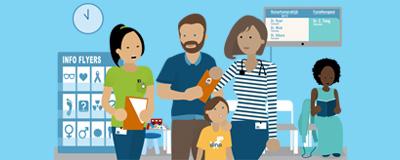Effective strategies to better involve patients with multimorbidity and limited health literacy in decision-making in general practice.
Effectieve strategieën om patiënten met multimorbiditeit en beperkte gezondheidsvaardigheden beter te betrekken bij samen beslissen in de huisartspraktijk
Kwetsbare patiënten hebben vaak moeite om alle medische informatie te bevatten. En om te verwoorden wat ze belangrijk vinden in een beslissing. Huisartsen vinden het dan moeilijk om Samen Beslissen toe te passen.
Doel
We willen Samen Beslissen mogelijk maken voor patiënten met meerdere chronische ziekten én beperkte gezondheidsvaardigheden. We ontwikkelen daarom een simpele aanpak om Samen Beslissen te ondersteunen.
Werkwijze
We gebruiken de volgende vragen als uitgangspunt: ‘Hoe kunnen we deze patiënten het best helpen om te verwoorden wat ze belangrijk vinden in een beslissing?’, ‘Welk hulpmiddel is hiervoor geschikt?’ en ‘Voelen patiënten zich beter gehoord als de huisarts het hulpmiddel gebruikt?’.
In 20 praktijken doorlopen we 4 fasen in 4 jaar:
- We nemen bij 60 patiënten Samen-Beslissen-gesprekken die de huisarts voert op video op
- Samen met huisartsen en patiënten ontwikkelen we het hulpmiddel
- We trainen de huisartsen in Samen Beslissen met het hulpmiddel
- We nemen opnieuw 60 gesprekken op


